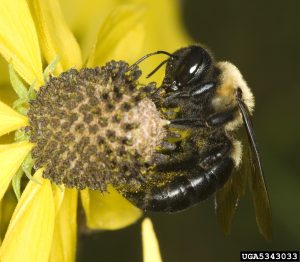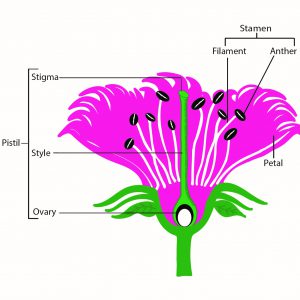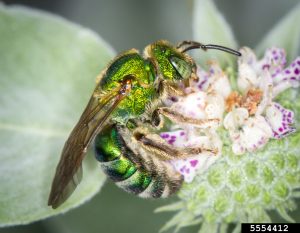June is Pollinator Month! Pollinators are crucial for the reproduction of all kinds of plants. You’ve thought about where a baby comes from, but have you ever thought where a peach comes from? Let’s explore why June is dedicated to these essential creatures.

What are pollinators?
Pollinators have a critical role in plant reproduction. There are several animals that are considered pollinators and help plants reproduce by carrying pollen from one flower to another. They include bees—honeybees and bumblebees—along with butterflies, hummingbirds, beetles, wasps, bats, and even some ants.
Back to the Basics
What does this have to do with plant reproduction?
Here in Central Florida, we are all very familiar with pollen. Besides triggering your allergies, pollen plays a role in plant reproduction and ecosystem support. Pollen fertilizes the ovaries (female parts) of flowers and is a food source for certain animals, such as bees.

The Birds and the Bees
Some plants are angiosperms, and they produce flowers. These flowers have several combinations of male and female parts respectively the anthers and the ovaries. Pollen can be found on the anthers (the male part) of a flower, and the goal is to get that pollen to the ovaries (female part) of that same flower or another flower of the same species, depending on the plant, since many plant have mechanisms in place to prevent self-pollination.

This is where pollinators come aide the plant. Pollinators (now you know where the name comes from) manually move the pollen from flower to flower. This process is essential for fertilization to occur, and the plants can produce fruit and more seeds. Fruit trees like) peaches and oranges, vegetables like cucumbers and tomatoes, and the State’s wildflower the Coreopsis all need pollinators to reproduce and produce the fruits and seeds that are crucial for their survival and propagation
Why are they Important?
Now that we know what they do, why should we care? Pollinators are crucial because not only do they keep ecosystems intact, but they are also responsible for the growth of about one-third of all the food we eat. For humans, 75% of our leading crop species and 35% of global food production depend on pollinators. Meaning, these crops would not produce ‘food’ without pollinators. Think about that next time you eat a strawberry or enjoy a cup of coffee.

Why are pollinators declining?
Pollinators are facing challenges such as pollution, over-reliance on pesticides, and habitat loss. It’s important for us to support these essential critters.
Supporting our Pollinators
So, how can we support these important creatures? Here are a few simple steps:
- Avoid harsh chemicals: Use Integrated Pest Management (IPM) and learn how to control pests by using alternative pest control methods besides pesticides, to protect your plants without harming pollinators.
- Plant pollinator-friendly gardens:
- In Central Florida, good choices include flowers like pentas, salvias and sunflowers. Herbs like basil when it’s left to flower are also great for attracting pollinators.
- Provide habitat:
- Consider putting up bee houses to attract solitary bees or installing puddling station for butterflies who are looking for water, the idea is to create inviting spaces for pollinators.
- Spread the word:
- Educate others about the importance of pollinators and encourage them to take action in their own gardens.
Did You Know?
Have you ever seen a bumblebee covered in yellow powder? Then you have seen a pollinator at work! Bees are responsible for responsible for 25% of the world’s food production, but they’re not the only pollinator.
In Central Florida, common pollinators include honeybees, bumblebees, butterflies like the Monarch and Gulf Fritillary, hummingbirds, and carpenter bees. Did you know some bats play a role in pollination as well? In Central Florida, the Mexican long-nosed bat is a key pollinator.
Summary
Pollinators—from bees and butterflies to bats and birds—they are vital to ecosystems worldwide, ensuring the reproduction of countless plant species. Their role in nature highlights the connection individual species have on ecosystems and biodiversity in the bigger picture. Protecting and conserving pollinators is essential for sustaining both our natural environments and agricultural (food) productivity.
Have a question?
If you have any questions about gardening in Central Florida, please contact UF/IFAS Extension Pasco County at 352-518-0156. For more information on UF/IFAS Extension Pasco County Community Gardens, and how you can join one, visit http://sfyl.ifas.ufl.edu/pasco/. Supervising agent: Dr. Whitney Elmore. Co-Author: Jim Moll.
Follow us!
We have several ways to connect. Visit our Facebook, Instagram, Eventbrite, Blogs, Florida-Friendly Facebook, Website
More resources:
Pollinator info:
- Who Are the Pollinators
- Pollinators: it’s not all about the bees
- Parts of a Flower
- Strategies to Increase the Adoption of Residential Pollinator Gardening: Tackling Perceived Barriers
Supporting pollinators:
- Florida Bee Garden Tool — Florida-Friendly Landscaping™
- Consumer and Producer Perceptions and Preferences for Pollinator-Friendly Labeling Practices in the US Green Industry
- Florida’s Keystone Plants
- Gardening for Bees
- Attracting Native Bees to Your Florida Landscape
- UF/IFAS Polk County Factsheet – Creating a Pollinator Hotel
- UF/IFAS Gardening Solutions – Pollinator hotels and your resident pollinators
- Perfect Plants for Pollinators
- Tropical Milkweed and OE
- Butterfly Gardening in Florida
 3
3
